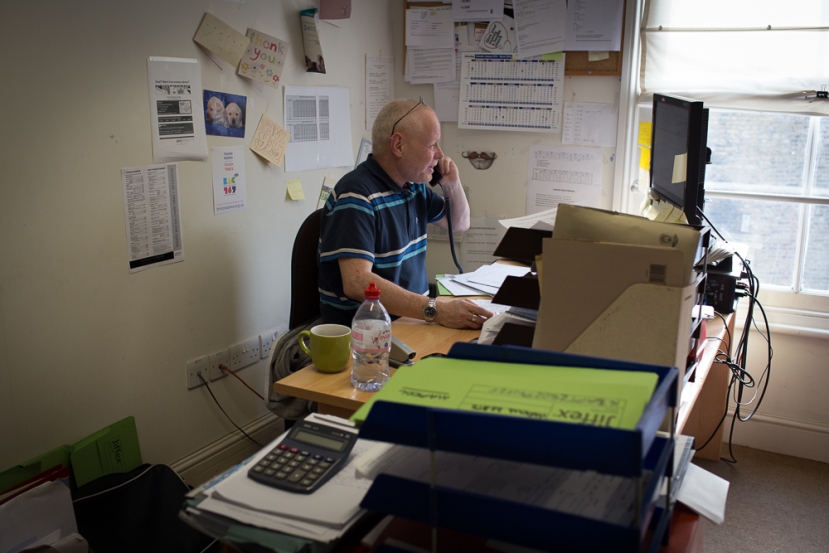Guilty until proven innocent

Benefits “overpayments” and why you should keep paperwork for the rest of your life
Pete Woan is Brixton Advice Centre’s Specialist Money Adviser. He helps people with a whole range of debt problems, from credit cards and loans to utilities, council tax and benefits overpayments. He’s been at BAC for 10 years.
Two of the most common forms of debt he deals with are benefits overpayments and council tax. Benefits overpayments in particular are causing some very serious – and unjust – issues for BAC clients, he explains.
“With credit debts – loans, credit cards etc – if we can prove there’s been no contact between the creditor and the client for more than six years then we can challenge the debt,” he says. “It’s what’s called statute barred.”
Benefits overpayments are different, however. “There’s a clause in the Limitations Act that says it can be clawed back at any point. And there’s something called Direct Earnings Attachment which means that if you’re working they can go straight into your wages – they don’t have to go to court.”
Fair enough, you might think, if someone has received taxpayers’ money that they shouldn’t have. But it’s not always quite as straightforward as this might sound.
Pete and other advisers at BAC often work with clients who have been overpaid by the system through no fault of their own – they haven’t over-claimed, they’ve simply been paid the wrong amount. Paying that money back is not straightforward – it’s a bureaucratic process that can take several months. For those living on the breadline, people who are sometimes choosing between food and homelessness, holding onto this money for a period of many months is simply unrealistic – if they even understand that they’d been overpaid in the first place. So many people are ending up in debt simply because of mistakes made by local councils and the Department for Work and Pensions (DWP). “It happens all the time,” says Pete.
What is perhaps even more disturbing – something that I suspect most people would have no idea about, as I didn’t – is what Pete tells me is happening to some past benefits and tax credit claimants.
Benefits “overpayments” include situations where the council or DWP come back to a claimant, sometimes many years later, and say that paperwork is missing – paperwork that the claimant should have supplied when they first made their claim. In such cases, the burden of proof is entirely on the claimant. So if the council simply loses a document that was, in fact, correctly submitted at the time, it can demand the claimant produces a copy of that document or they will have to pay the money back.
Pete offers an example. “I worked with one woman who was claiming Pension Credit for her and her husband,” he says. “Her husband wasn’t well and they had a Pension Credit for a few years, and everything was fine. Then her husband sadly died. Within two weeks, [the DWP] contacted her and said they weren’t aware of the fact that her husband had an occupational pension, and that they wanted to recoup the money. We’re talking two or three thousand pounds. She was absolutely certain that she’d told them everything, given them everything they’d asked for, but they said they had no record. We appealed, but it was thrown out and she had to pay all of the money back. All because she hadn’t kept a copy of the paperwork.”
It seems extraordinary – and frightening – that once you have already jumped through the hoops and proved what you need to prove to receive your benefit that they can still come back years later and take the money back because they’ve lost your documentation. My assumption would be that if they gave you the money in the first place, that should be proof enough that you’d given them what they required. Not the case, says Pete, who sees situations like this frequently.
“I had another client who was being chased for a housing benefit overpayment,” he says. “They said that she hadn’t provided them with some piece of documentation back when she first claimed. She knew that she had, went back through her records and found it, with the receipt stamped from Lambeth saying ‘received’. So they admitted their error – but if she hadn’t kept that piece of paper for all those years, she would have had to pay them £4,000, despite the fact that she was in the right.”
Pete also sees this with council tax payments – people are chased for not paying it when they have. If you pay by direct debit then it’s easy to prove, but if you pay by cash at a PayPoint, and if you don’t keep your receipt, then years later you could still be chased for money that you’ve already handed over.
Because these “debts” are not statute barred [assuming the council has obtained a liability order], there is no time limit. What’s more, they can take this money direct from your salary at fixed percentage rates, without any discussion about what you can afford. And there’s absolutely nothing you can do about it.
Pete’s advice is simple: “Keep everything, forever,” he says. “Be a hoarder. If you take anything up to Olive Morris House (Lambeth Council’s Customer Care centre in Brixton), don’t leave without getting a receipt. If you post anything, send it signed for. It costs a bit extra but it’s guaranteed and you have a record. Photocopy everything you send to them. You have to protect yourself.” And this is not for six years – this is for life.
I ask Pete why he thinks the paperwork in cases from many years ago is being looked at again. “I spoke to someone at Tax Credits a while back,” he says. “They indirectly admitted that they’re actively trying to claw money back wherever they can.”
Of the other forms of debt Pete deals with – rent arrears, utilities, credit cards and loans – he says that job loss, ill health and bereavement are the most common causes.
“You might have someone who’s worked for 20 years but then they have an accident that means they can’t do what they did any more,” he says. “It’s the same with bereavement, suddenly everything just gets on top of people and they can’t cope. I’ve had clients in here in tears because they’ve never been in debt before. All it takes – for any of us – is just one little glitch.”
Another factor is the changes to benefits that were introduced in 2013 – something that I’m hearing a lot about from the various organisations I’m collaborating with (see my earlier interview with Nathan Scott, BAC’s Welfare Benefits Specialist <LINK>). Since October 2013, if your benefits are cut, it happens immediately and there is then a delay of several months before you’re allowed to appeal.
During this time, your money is cut off and any other means-tested benefits – such as housing benefit and council tax support – are also cut. “When this happens, where people stop getting any money, they start falling into debt,” says Pete. “They can’t pay their rent, their gas, their electric, their council tax, their credit card bills, etc. Things they were dealing with perfectly well before start to fall apart, and it builds up very quickly.” This leads to debt, eviction notices and, in extreme cases, homelessness.
There are of course also clients who overindulge with credit cards, he says. And sometimes he gets frustrated when clients don’t help themselves – he’s worked with some people to come to a favourable agreement with a creditor where they pay their debt back in small monthly payments over a long period, but they then fall behind, with no change in their circumstances, and they’re back to square one. Many clients struggle with budgeting, prioritising the wrong debts and paying things at the wrong time, he says.
This, he believes, will be exacerbated with the introduction of Universal Credit. Under this new system, currently being trialled but expected to roll out nationwide by the second half of 2017, housing benefit claimants will be paid housing benefit, rather than the money going directly to landlords, and all the money will arrive in one monthly sum.
“They’re not used to managing this much money,” he says. “I think we’re going to see more debt, more eviction notices and more possessions. It’s the worst thing they could do.”
The volume of clients Pete deals with has steadily increased over the years, and he believes things are going to get worse before they get better. “Advice Centres are getting cut,” he says. “Drop in centres for homeless people like Thames Reach are getting cut. The demand is going up, and yet the services are being cut. I can’t understand it.”
James Hopkirk, April 2016
If you’d like to get in touch, please don’t hesitate to reach out to me on Twitter or by email at james@jameshopkirk.com. In particular, I’m hoping to hear from Lambeth residents who have experienced the sharp end of the government’s cuts and who would like to collaborate with me, share their stories and help to raise awareness of what’s happening in our borough
Sign up to our news updates and get an email whenever James publishes an article by clicking here





